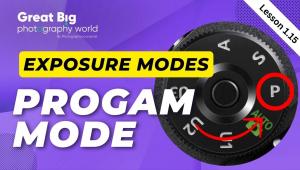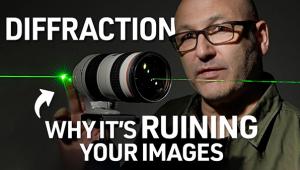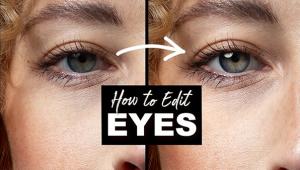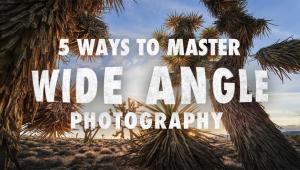Among the options of interchangeable lenses, I like the higher megapixel you get from a slr camera. I have the Canon 5D. I love this camera!!!
Please comment briefly on how you weigh these options when making a buying decision.
- Log in or register to post comments

I've never taken my big mid-1990s film SLR on a family vacation. I want the convenience of a good point-and-shoot camera with enough zoom to get the job done. They're fast and capable. However, SLRs with their separate lenses, filters, tripods, and so on certainly have their place. When I'm out by myself in a National Park or a botanical garden I always take my big SLR and its gear bag. I have thought about what my next digital camera should have -- more zoom or more megapixels. The answer for me is more zoom. I can get by with 4-5MP as long as I have enough zoom to get me in close and NOT have to do much cropping. The new 10-12X zoom digital cameras typically come with some form of image stabilization, too, which is very important when you're shooting out at 432mm. The convenience of having everything built in is a strong selling point for me. I want good vacation photos, but without all the bother of schlepping around my SLR gear. Right now, months away from making a purchase, my next camera will probably be a Canon PowerShot S2 IS, for all of the above stated reasons. I'll get off my soap box now.

I'm leaning towards the Fuji S9000. But the Nikon D50 is an interesting option, the rest do not interest me. The D50 is more expensive but has 2 advantages focus speed and considerably better ISO 1600. After 40 years of film from 4X5 to 35mm I am not sure I want to go back to the bulk and weight.

I have high quality prime macro and shift lenses from my film SLR that a want to use on a DSLR. Even though using them on a DSLR will restrict aperature and focal range, I think it's worthwhile. With the purchase of the DSLR I would purchase a couple of digital camera specific moderately price zoom lenses to cover normal snapshots,i.e; 30mm to 300mm (35mm range), and use my existing prime film SLR lenses for macro, shift and extreme telephoto. I do mostly landscape and nature photography. Over the years I've invested in many high quality prime lenses. To not use them would be difficult for me to bear.

These super zooms are ok for point and shooters, but I love the depth of field you get with a larger sensor and a faster aperature. You just can't get that with those cameras along with some other things like, lack of Chromatic Abreassion and barrel/pincushion distortion that is common in these cameras with more than a 3x zoom. Another point is wide angle. Show me a superzoom that goes down to 15mm equivalent. It just isnt there. The noise at higher ISOs just isnt acceptable with those smaller sensors either. If they made one with atleast an APS-C sized sensor and controlled the noise like a DSLR then I might start to consider one, until then, its a DSLR for me.

I own a Canon EOS system with lenses from 28 to 200. I wanted the lens range, high megapixel count, and the ability to use real flash equipment. I just purchased a Canon Powershot Pro1 on boxing day . It is the equivalent of the Digital Rebel with all of my lenses rolled into one, but cost half! I could not justify purchasing the Digital Rebel.

The greater range of available lenses and accesories and, of course, the larger sensor in DSLRs make the DSLR option work for me. That said, recent developments in non-mirror digicams using larger sensors and fantastic lenses may cause a rethinking.

I have been using my Panasonic DMC-FZ20 for one year now and I love it. In fact, I am seldom found without it. It has a great range of wide and long and there is no extra equipment need to achieve really great pictures. There are even adaptors available for the really long and wide stuff. Recently a was at an FSU football game and there was a guy there with a with a Nikon and a big sports lens. His wife was interested in my camera so I let her look at it. When I let him hold it, he ask about the zoom, and I told him that it was 12x, which is 32mm to 420mm. His eyes where as big as saucers and he responding by saying that 420mm?! That is almost what I have with this sports lens. Priceless.

The only drawback to 10x digicams (and all digicams for that matter) is the lack of a high-end chip. Manufacturers should let the consumer decide by offering the same camera with an option for the consumer chip or the full 35mm equivalent chip. Why isn't the Canon EOS-1Ds Mark II (pro) chip available on the PowerShot (consumer) line? The same question applies to all manufacturers. Is there that big a difference in manufacturing or is it market manipulation?

I still haven't made the jump to digital photography. But if I do, I can't see myself wasting the money on a integral lens point-and-shooter (which is what they amount to, say what you will). If I were to switch, it would be to a digital SLR.

Although I love the idea and simplicity of the digicams, they are limited in their capabilities. I use a Nikon D2X and a D100 along with numerous lenses for the ability to shoot what I want the way I want. I also love the ability to use flash off the camera which is an option most digicams lack.

I have a DSLR and I looked at the 10-12X integral lens cameras before I bought and felt that their light weight composite overall feel made me classify them as a toy. I would hate to go out on a serious shoot with a mini-camera no matter how good the specs are.

My Canon PowerShot Pro 1 is blessed with a great lens, and produces excellent images as long as I don't ask it to do things it wasn't designed to do. Like shoot moving subjects or be an available low light champ. I use it for what it's good at, which is photographing stationary subjects. Camera response and current EVF technology makes all digicams poor choices for capturing active subjects. So, it really boils down to the type of subject matter one likes to shoot. I love using my small, light, and stealthy Pro 1, but it's not a replacement for my DSLR. As a matter of fact, since I don't own a wide angle lens for my DSLR, my digicam serves as my wide lens on a dedicated body. The two camera types compliment each other just fine. Works for me.

As a photo lab technician, I am still not seeing the same quality from digicams as I have been seeing from DSLR's. The images seem to be far more noisey, and underexposed. I know a lot of that is due to the inexperience of the photographers, but I am not sure that they can yet equal a good DSLR.

































